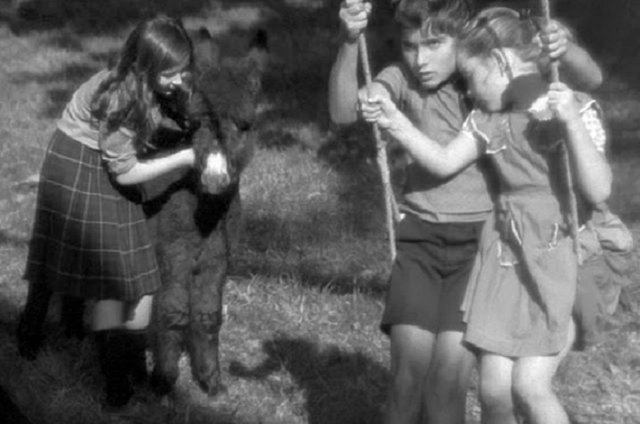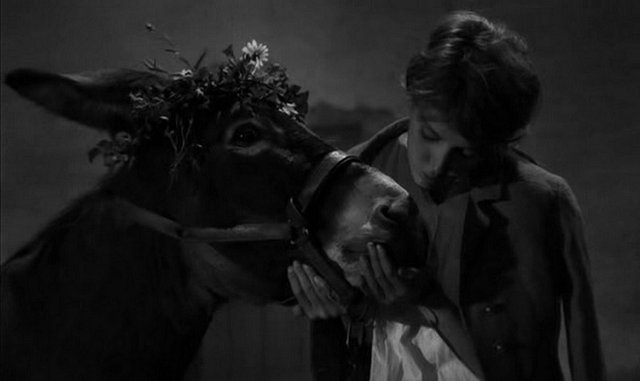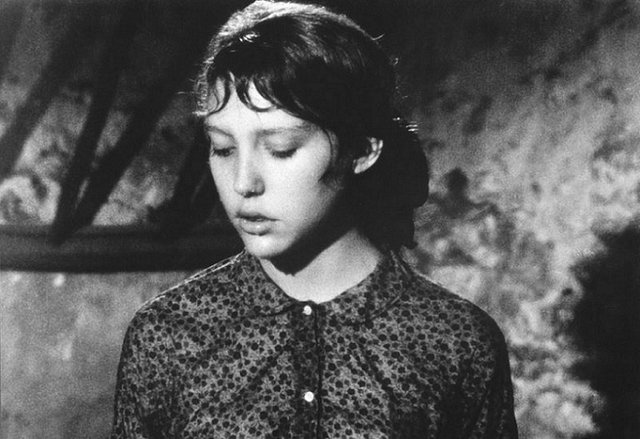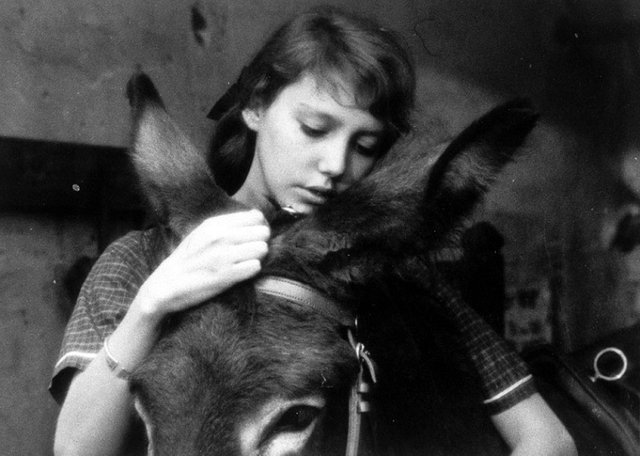[MOVIE REVIEW] Au Hasard Balthazar (1966) by Robert Bresson
Au Hasard Balthazar is Robert Bresson's portrayal of humankind through the eyes of a donkey and its seven owners. You might think that today's audience would have a hard time identifying with the saintly donkey carrying man's burden on his shoulders, only to be beaten, neglected and ultimately rejected. But all the extreme aspects that Bresson gives his characters, form a sort of recognition that leads to self-reflection. This experience is timeless.

The black and white images of the famous cinematographer Ghislain Cloquet capture the hard, brutal life in a small French country village. The unfortunate animal, named after one of the three wise men, is beaten and tortured by a series of cruel and criminal owners, before a stray bullet puts an end to this parable of penance and grace, with a masterly condensed imagery.
The film begins with Marie, a shy farm girl who takes care of the little baby donkey Balthazar. When Marie grow up, they become separated, but the film showcases both of their fates in a parallel existence. They are both victims of the dark aspects of man. It culminates in Marie being raped. Balthazar is amazingly enough the protagonist of the film and Bresson deserves all the respect in the world for managing to give a the donkey a sense of personality and glow. Balthazar carry his suffering in a noble way, and there is a sort of wisdom that is reflected in his eyes. Bresson was quite open with the film being an allegory of the fate of Jesus and the humane qualities of man. It's no coincidence that both Marie and Balthazar have biblical names.

It's not the characters themselves and their qualities that make Au Hasard Balthazar a memorable film. It's rather how they interact with each other and the world itself. It's difficult to relate to these characters, but we can sympathize with them because we at some time acted similarly.
The opening sequence of my Au Hasard Balthazar belong to one of cinema's most beautiful five minutes. There is no better example of Bresson's poetic film language, and how much it differs from all other ways of making films. The images succeed each other: We see a donkey, Balthazar, being baptized and sanctified by a couple of children: Jacques and Marie, who carve their names in a heart on a wooden bench.
We see a sick girl taking a teaspoon of medicine; we are later told that she's terminally ill. We see Jacques traveling away, but promising to return next year. Without even knowing the cuts of the children and the donkey melt together unnoticeable into a rhythmic and beautiful flow of images.

This is so far from the vulgar and pointless display of sound- and special effects of today's film industry. Instead of music Bresson wanted to allow the sounds and images work together to achieve a rhythmic cinematic poetry. The Frenchman said that what is not visible on the screen affects the viewer more than what actually appears. The ideal would be to not show anything at all. So Bresson approached the minimalist idea that the only really perfect movie is the one that can't be made.
There is a mood in the opening sequence that evokes beautiful childhood memories. But behind the shimmer a dark reality hides. The scream of a donkey snatches hold of us. Marie and Balthazar grows up. Their life's are portrayed against each other. Balthazar changes owners, just as Marie replaces lovers with disappointments. And so Au Hasard Balthazar unfolds into an austere portrayal of man's cruelty.
The well-known author Marguerite Duras likened the art of cinema before Bresson with a parasite that fed on other art forms. Godard, another important director, felt compelled to point out that he had a tendency to exaggerate, since he "loved film," but in the next breath he compared Au Hasard Balthazar with Blaise Pascal - the movie had touched him in the same way that Pascal's texts about passions had.

According to Godard, Au Hasard Balthazar contained the whole world. In ninety minutes the viewer experience childhood and death and everything that happens in between. In this case, it's a life almost completely drained of love and compassion. All the characters in Au Hasard Balthazar are selfish and self-righteous, unlike Balthazar, who become a sort of Christ figure. Balthazar endure everything his owners' have in store for him, and become the moral conscience of the film. The point of the film however was not to mock humanity. The fact that people act selfishly doesn't make them less worthy of love. Bresson's humanism permeates all of his films. Maybe Balthazar endures his pain so well due to his constant belief that someday Marie, that took care of him as a baby donkey, and the only one who ever showed him love, will return? She represents humanities ability to be redeemed. There is hope in humanity as long as Marie exists. She is the proof that humankind is worth being saved.

Bresson's films are the first to have approached a sort of cinematic poetry, a cinematic world in which the film no longer clings on to older art forms, but are taking their first stumbling steps into the open. It would be wrong to say that Bresson's films were ahead of their time. He didn't really have any successor, apart from maybe the Dardenne brothers. Bresson didn't form a school of cinema. But the magic of his cinema is not dependent on an obscene budget or the smiles of beautiful movie stars. The magic of Bresson consists of the immediacy and specificity of his images, in the humanism, and in all the things that remain untold.
The final scene is cinema at its finest. Just this scene alone makes it worth seeing the film. It will forever remain etched on my retina, and the last few deeply affective minutes, accompanied by the andantino from Schubert's 20:th piano sonata, still makes me cry like a child. It's indeed as Tarkovsky claimed: that the main purpose of art is to prepare us for death. Au Hasard Balthazar is a film that shows how masterful Bresson was at illustrating the great in the simple and small.

Thank you for such a touching review. You made me want to watch this film, and it's something I'll do in the nearest future, as soon as I find time for movie. :)
Thank you Aleksandra! You should set aside some time for it definitely. It's a profound experience that will stay with you for as long as you live.
Guess most probably it'll be this weekend then :)
Would love to hear what you think about it! :)
A lovely review. Great movie i will give a "treatment" on my blog at some time :-)
Looking forward to reading it!